About the Course Design
The TL;DR
- Content Focus: B2B sales and marketing in professional services
- Student Audience: Undergraduate business students studying
- digital marketing and analytics (primary)
- professional sales (secondary)
- Learning Goals:
- prepare students for B2B demand generation roles in marketing and sales
- provide appreciation of the business development side of digital marketing
- Primary Experiential Learning Method: semester-long role play
- Students play: sales interns at a digital marketing agency
- Industry partners play: customer with a student recruiting goal
- Core Supporting Content:
- Hubspot Inbound Sales and Inbound Marketing Certification Courses
- Dan Pink "To Sell is Human"
- Taught By:
- Prof. Mary Caravella, with academic and practical expertise in B2B sales and marketing
- Partners like you who join us to play role play buyers and coach students
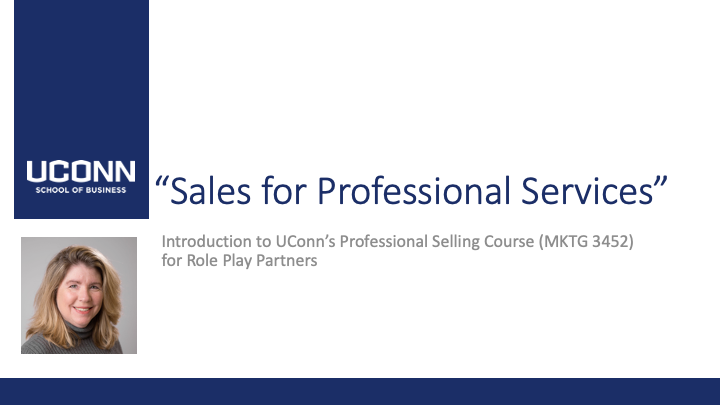
Every semester we teach an undergraduate course in Professional Selling at UConn, with a goal of providing our marketing students with knowledge, skills and abilities that help them be successful at companies like yours.
We'd like to to take you behind the curtain a little, and share with you how we designed this Professional Selling course towards that goal. Then we are going to and ask you to join us as a role play buyer and coach in the course, to connect with this next generation of talent and share your expertise.
You'll learn about
- The overall goal of the course, target student audience and learning objectives
- Design challenges for reaching our target student audience (and how we address these challenges)
- The structure of the marketing agency role play that serves as the core experiential learning method of the course
- The supporting content and how it aligns with the two live and two simulated role-play exercises
- How you can help our students on their journey to becoming sales and marketing professionals at companies like yours
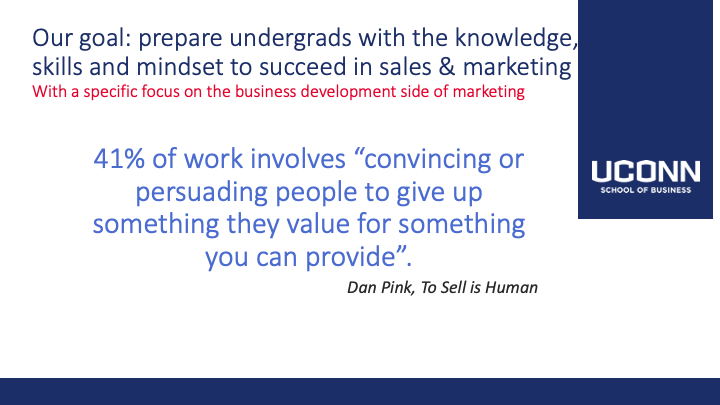
UConn has a long history of teaching sales. We are one of about 100 universities in the country that offers an undergraduate sales program. We see our mission as building T-shaped graduates- with depth in specific skills sets to let them quickly create value, and breadth in knowledge and mindset to grow into leaders in business and the world. Teaching sales as core to that goal, because – as Dan Pink points out --- we are all selling all the time.
In particular, we see a need to help our digital marketing students understand the business side of how marketing work gets done, internally at companies, and through marketing agencies. In their technical courses, we give our students marketing projects to implement– and they are good at it! But of course in the real world we don’t get marketing projects handed to us– we have to identify and develop opportunities, price out proposals to address them and build arguments for the resources to move forward.
This is sales. And this is why we think this professional selling class creates value for our students-- and for companies like you who hire them, in whatever role you hire them for.
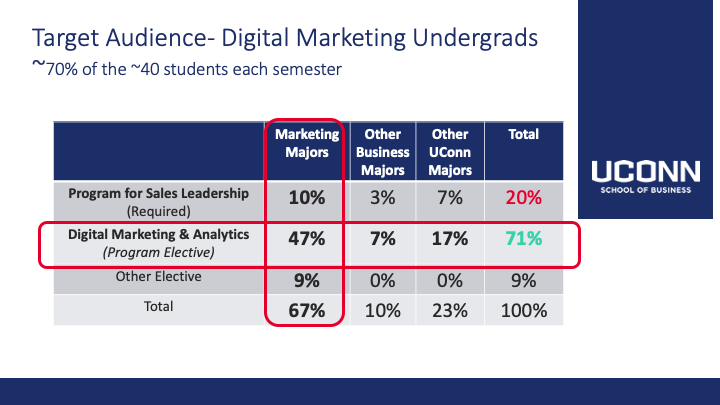
Right now we teach this course to about 40 undergraduate students each spring and fall semester. About 20% of those students are taking this course as a requirement for concentration or minor in Professional Sales Leadership. So for those specifically looking to start their career in sales, this course:
- Prepares sales leadership students to hit the ground running in entry-level sales roles for professional services organizations.
However our primary student audience is the majority who take this course as an elective option for their Digital Marketing and Analytics concentration or minor. There are two ways our elective option in professional selling creates value for them (and for you):
- Provides digital marketing students with appreciation of the business side of digital marketing: how marketing projects come to be, both internally and at marketing agencies.
- Prepares digital marketing students for careers in B2B marketing, where sales lead generation most often plays a primary role.
Our primary target audience leads to some specific design decisions for the course, starting with the learning objectives:
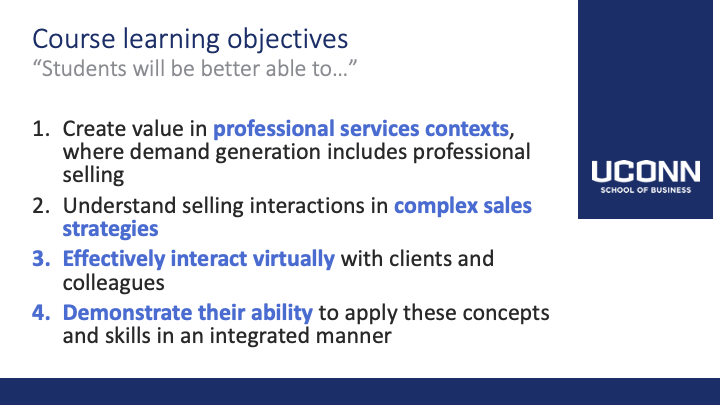
We have four broad learning objectives for this course. I’d like to highlight a few things.
- This course focuses on sales in professional services contexts, where products and services are customized to the client, and sold through professional sales forces.
- Due to this choice we are dealing with more complex sales strategies.
- This course also focuses on how to work effectively virtually. Even before the coronavirus, the simple fact that professional B2B salespeople build relationships between organizations at two different locations means they have to be skilled at email, phone and video communication as well as face to face.
- Finally knowing sales requires doing sales, and so this course requires students to demonstrate their abilities through role plays. As a result, experiential learning is core to this course.
There are a few challenges to deliver this effectively….
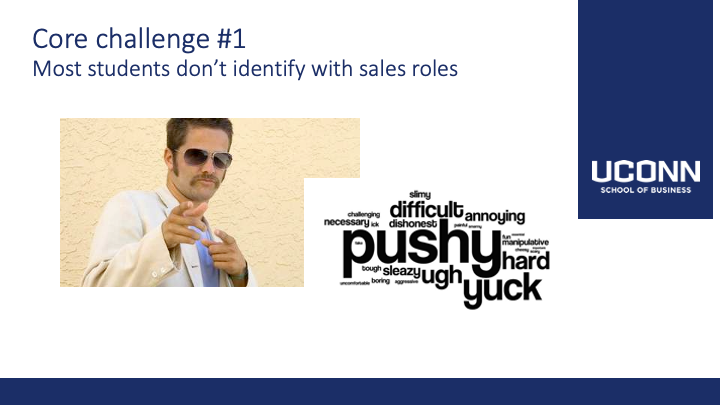
Most students don’t see themselves as this guy! Unless someone they personally know and admire is a professional salesperson, students tend to imagine the stereotypical salesperson when they think of sales. So they initially agree with the public perception that Dan Pink found when researching for his book “To Sell is Human”, the source of this word cloud. So, while we know that modern sales looks nothing like sales of the past, for most students, we are challenged to position sales as a value-added role. (This is a perennial problem across sales programs.)
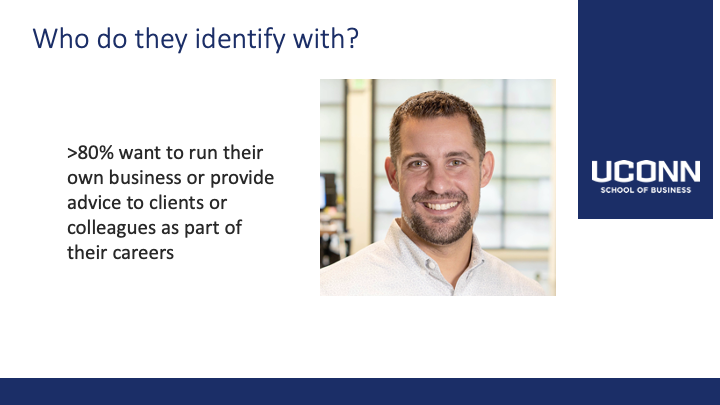
This is Bob Ruffolo, founder and president of Impact, an award-winning marketing agency, and a friend with whom we've been proud to collaborate on this course for over five years. My students definitely identify with Bob: more than 80% report wanting to have a career that involves starting their own business or providing advice to clients or colleagues.
And as we who do these things for a living know: this is sales.
So when our students meet people like Bob, or professional salespeople at our other program partners, their perspective on sales is reframed. That's why interactions with sales professionals are such a key part of our sales program.
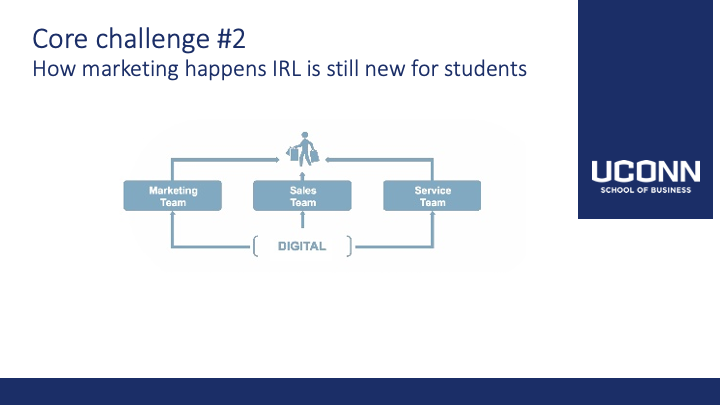
Another core challenge for this class is that, with limited work experience, students also have limited procedural knowledge about marketing. (This the formal term for "knowledge formed by doing", sometimes called tacit knowledge. Knowledge of facts and conceptual structures is referred to as declarative knowledge.)
So things we all know cause key challenges for B2B marketers and salespeople don’t resonate with students. For example, students largely lack experience with:
- Organizational structures and power dynamics, and so the challenge of selling to the people in a B2B buying center.
- Marketing, sales and service as sub-organizations, and so the challenge of delivering an integrated customer experience.
- Staying buoyant as a salesperson after the fifteenth ”not interested” of the morning, and so the challenge of sales enablement and productive relationships between sales and marketing.
This makes it challenging for students to initially appreciate the value of great content from sales thought leaders like Gartner, Hubspot Academy and Forrester SiriusDecisions. But it's not as if they don't have any practical knowledge- in particular...
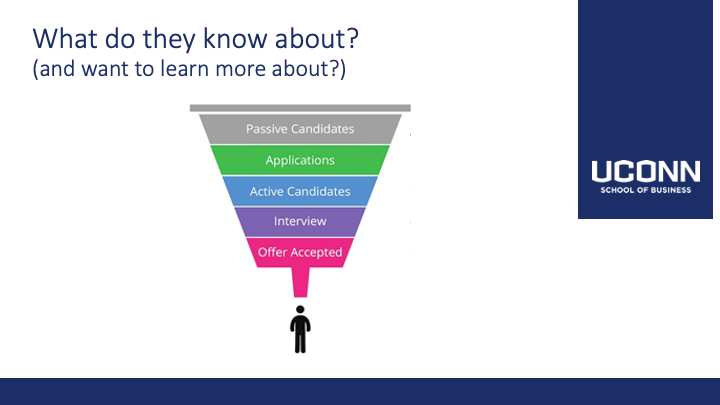
Students have a lot of procedural knowledge about recruiting! They were recruited to UConn themselves, and they are in the midst of the recruiting process for internships and full-time jobs while they take this course. In addition, students are very motivated to learn more about how recruiting works! So we leverage this knowledge and motivation, using a recruiting context to transfer their knowledge about recruiting to understanding how B2B demand generation happens in professional services.
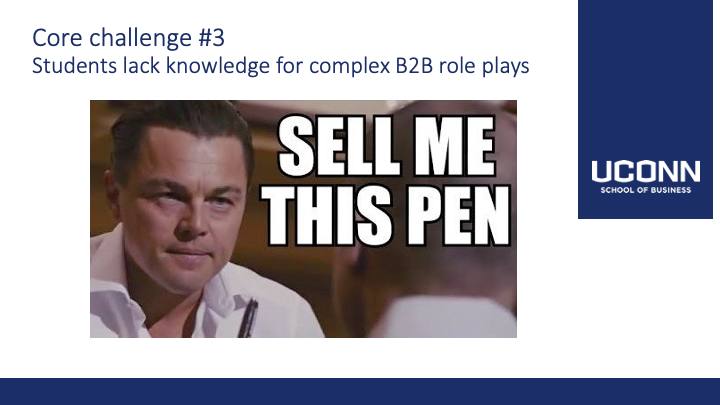
Finally, as we know, professional services products are complicated, and effectively selling them requires domain knowledge that students lack. Sales educators have used two strategies to deal with this challenge:
- Using "toy role plays" (like this meme-fodder scene from Glengarry Glen Ross).
- Putting onus on the students to learn content areas independently
Many sales programs with a primary focus on students preparing for sales careers successfully use the latter strategy, organizing around the content partner for the National Collegiate Sales Competition. However, with our primary focus on digital marketing students, we have found a different approach that works better for us...
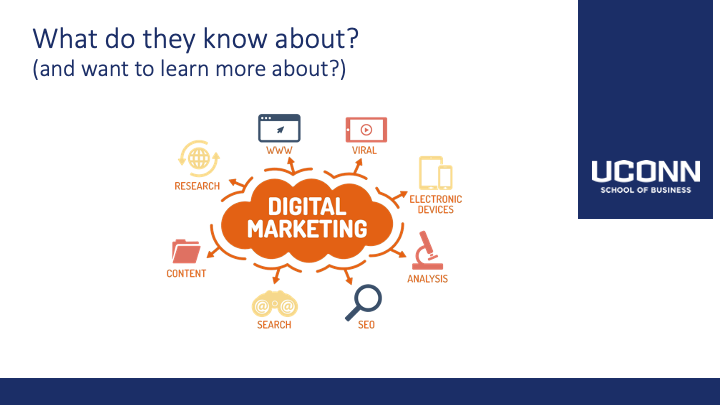
Students are learning all about digital marketing in the rest of their curriculum. We leverage this in the role play design, by having students sell digital marketing services.
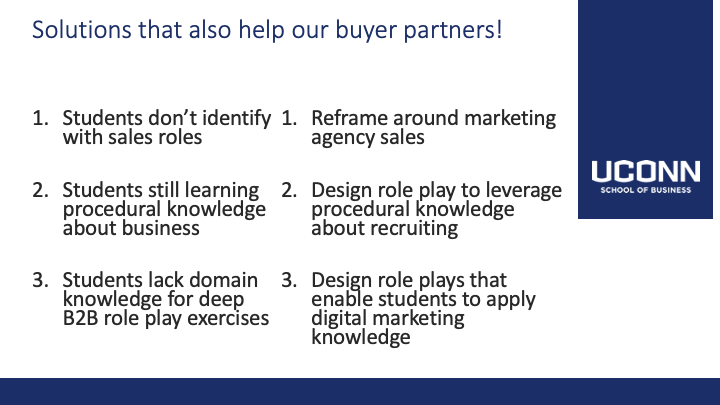
Here's a summary of these three challenges to teaching complex B2B sales to undergrad students, and how our course design aims to solve them. We think that this design also helps you our partners come quickly up to speed on our role play scenario as well, making it easier for you to coach the students.
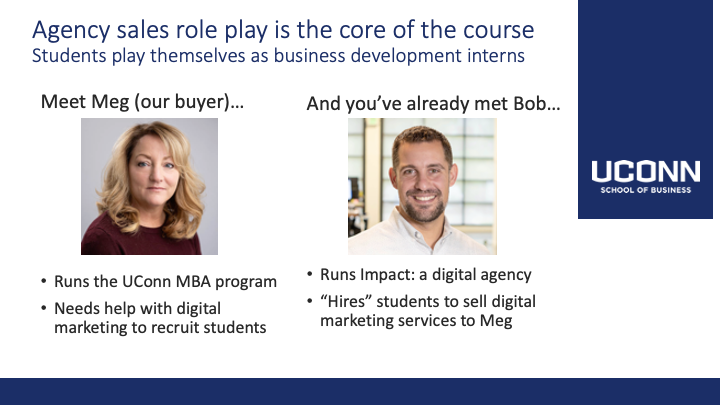
Now a brief overview of the semester-long role play that is the experiential center of the course. Role plays are of course artificial situations, and this can sometimes get in the way of learning, So in our design, we connect real people from two real organizations, and the students play themselves as mock-hired interns.
Meg Warren is the initial buyer in our role play. Meg runs the UConn Full Time MBA Program, and needs help with digital marketing in order to recruit students. However, she's not a marketing expert. So you don't need to be an expert in marketing to role play Meg, you just need to be interested in learning how to attract students to a program (sound familiar?)
You've already met Bob and his digital agency. In our role play, Bob mock-hires the students to be business development interns at his agency. So the students are playing themselves, and can use their authentic personality and experiences to practice connecting with our buyers.
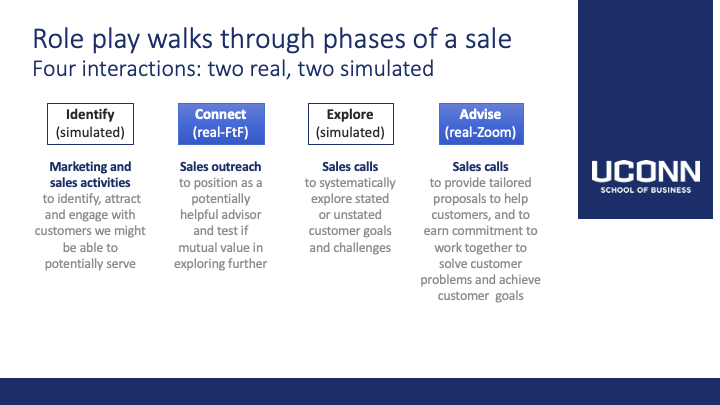
Throughout the course, the role play walks through the typical phases of a sales engagement. We've adopted Hubspot's Inbound Sales terms for these phases, to give students a common language used in practice. If you are familiar with another sales methodology, you might use different terms for these phases.
Importantly, we start with the "identify" phase: all the activities done by both marketing and sales to take an organization's broad definition of its target segments, and positioning of its products and services to focus on, attract and engage those customers the organization is best positioned to serve. This gives us a connection point for concepts that the students have learned in their core marketing class, as we jump into the world of B2B marketing and then to B2B sales.
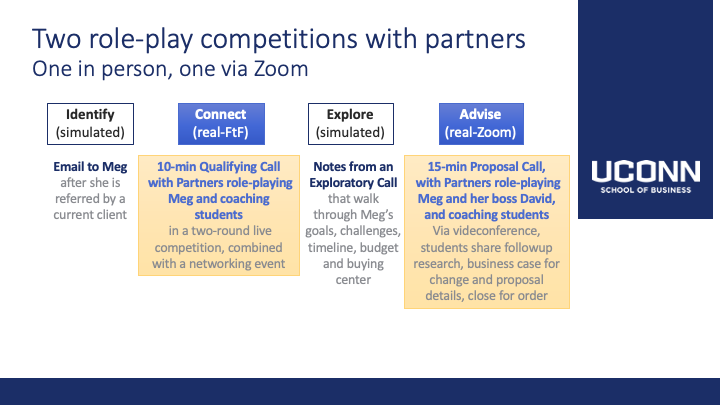
There is an experiential activity for each phase in the sales process, two simulated and two with partners playing buyers in real time. (learn more about the "Connect" role play in-person competition here and the "Advise" role play via Zoom here.
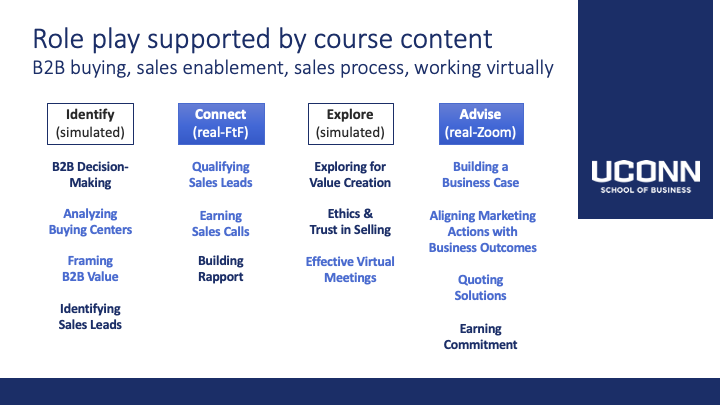
Here are how the course content modules support the experiential exercises. The items in blue are content areas where typical content covered in an introductory sales course is augmented to better fit our target digital marketing students audience and professional services context.
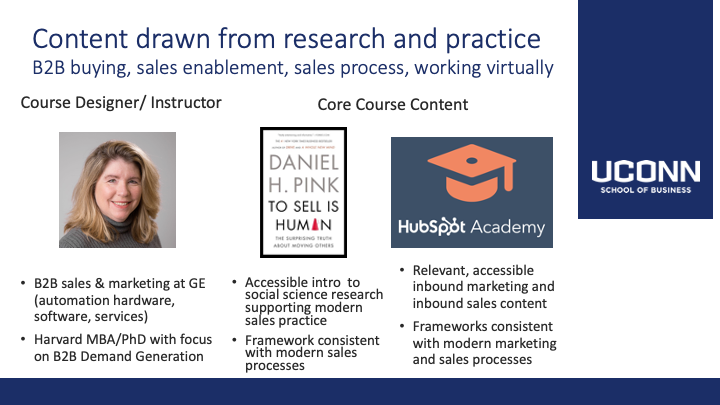
Course content is drawn from both the best research and the best practice. Our course designer and current instructor is Mary Caravella, who brings a wealth of both academic and practical expertise to this course. Her current choices for core content sources are: Dan Pink's To Sell is Human, and Inbound Sales and Inbound Marketing Certifications from Hubspot Academy, all mentioned earlier.
She supplements these core content sources with regular reviews of:
- research published in top academic journals covering B2B marketing and sales, such as the Journal of Marketing and the Journal of Personal Selling and Sales Management), and new textbooks covering selling and digital marketing
- content published by thought leaders in practice, including Harvard Business Review, Gartner, Forrester SiriusDecisions, Jill Konrath, and last but not least Impact.
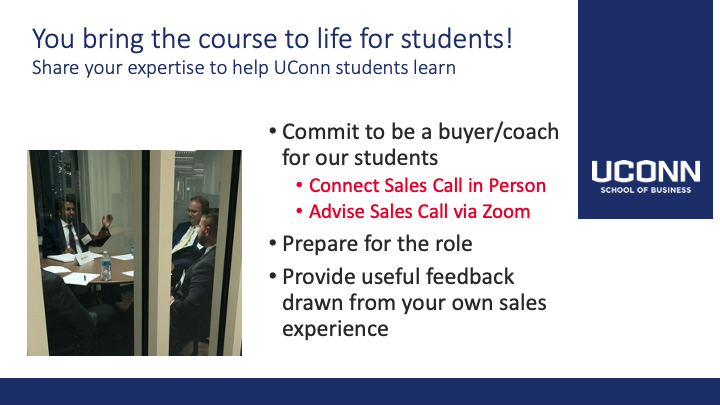
However Professor Caravella is not the only one teaching this course! Active support and participation by our Program for Sales Leadership Partners is crucial to the success of the course. Every semester more than 30 representatives from our formal partners and larger network of friends of the program connect with our students, role-playing Meg and her boss David, and coaching them on their journey to becoming marketing and sales professionals.
And so now we're at the "earning commitment" stage...
- Have we convinced you that we are creating value for our students?
- Have we motivated you to be a part of creating that value?
Ready to Volunteer?
Your participation makes this role play real for the students!
Sign up here for our next "Advise" Role Play
Thursday April 30, 9:30-11:00, via Zoom
